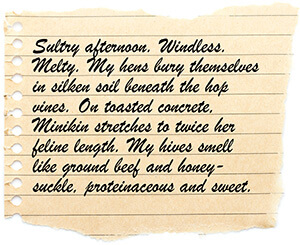
Many of us keep some type of beekeeping log. A log contains data — facts and figures that describe what we found, what we did, and what comes next. It may also contain colony maintenance reminders, to-do lists, and inspection notes. Some of us record these reminders in a notebook or digital device, while others scratch code inside a telescoping cover.
Before doing my rounds, I gather the things I will need, then proceed from hive to hive, performing tasks and recording colony health. I work as fast as possible, always in a hurry to get done. It’s sometimes fun and sometimes a chore, but logging can fast-track you into becoming a successful beekeeper.
Log vs. journal
Beyond logging, another rewarding record you can keep is a journal, a collection of notes and reflections that float unbidden into your beekeeper’s brain. A beekeeping journal is not a record of inspections, queen replacements, and mite treatments. No, not that. It’s more like a series of screenshots, your bees’ activity, visitors, environment, and adventures. Or sometimes it’s a snapshot of your bee-inspired brain — an idea for a try-it, a fix-it, or a better way to manage your colonies
Unlike a log, journal entries can be soft and amorphous, their benefits fuzzy and inscrutable. While logs (other than those we cut from trees) won’t keep you warm on a chilly winter’s night, a journal most certainly will. It can fill you with cozy gratitude for bees, nature, and the wonders of life, something that’s especially helpful when day-to-day trivia dampens your spirit.
When you observe and record bee life, you learn about your own. You absorb triumphs and failures, theirs and yours. Your notes help guide you through conflict and contradiction, disagreement and indecision. Of course, we can observe without recording, but the act of recording helps us learn, interpret, and remember.
Rules for journal-keeping
Heads-up here: Journal-keeping has no rules. Having kept notebooks most of my life, I’ve discovered the best ones have the least structure. If you have unrealistic goals like writing every day, writing without cross-outs, or using only blue ink, you will quit in frustration. In my mind, journaling should be free from psychological stress. Don’t worry about grammar, spelling, or complete sentences. Don’t obsess about neatness or following the lines. These left-brained contrivances can kill creative thinking.|
Instead, scribble in your notebook when a passing thought intrigues you or when you have a question. Jot down conversations, project ideas, and links to articles or videos. If you coin words or have lousy spelling, no one cares.
When I review my old journals, the ones that make me happy are the ones I wrote without censorship. They contain drawings, diagrams, mind maps, poems, random words, overheard snippets, quotes, recipes, questions, and ideas. I review these bee-related musings when I need a plan, a story, or an inspiration.
Often, these notes simmer in my subconscious until, with little warning, they germinate into a project. Inspired by my own cacography, I’ve tried keeping a website, submitting an article to ABJ, and learning to identify native bees — all things that worked for me. I also tried to design a section super (so-so results), keep an outyard (abject failure), and harden my black bear defense (didn’t do it; paid the price). My foray into building a straw-bale pollinator garden ended when dozens of leafcutter bees nested in the hollow straws (misalignment of goals).
Of course, not everything we write is worth keeping. I’ve crossed out multiple pages of mush, rants, and AI-style hallucinations. But garbage is okay because it helps us learn (and you’ve got to put it somewhere).
What’s inside a beekeeper’s journal
My beekeeper’s journal is also where I keep detailed… (end of excerpt)


